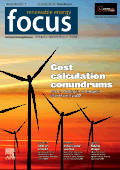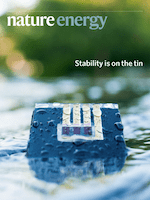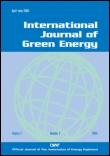
Advances in Energy Research
Scope & Guideline
Shaping the Future of Energy with Groundbreaking Research.
Introduction
Aims and Scopes
- Renewable Energy Systems:
The journal covers extensive research on renewable energy sources such as solar, wind, and bioenergy, exploring new technologies and methodologies to enhance their efficiency and integration into existing energy systems. - Energy Conversion and Storage Technologies:
Research on various energy conversion processes, including fuel cells, batteries, and thermal systems, is a key focus area, with studies aimed at optimizing performance and minimizing losses. - Thermal Performance and Energy Analysis:
The journal emphasizes the importance of thermal performance analysis in energy systems, including experimental investigations and theoretical modeling of heat exchangers, receivers, and energy management systems. - Environmental Impact and Sustainability:
The journal addresses the ecological and economic aspects of energy technologies, including life cycle assessments, sustainability analyses, and the development of eco-friendly energy solutions. - Innovative Materials in Energy Applications:
Research on advanced materials for energy applications, such as catalysts and nanofluids, is highlighted, focusing on their roles in enhancing energy processes and systems.
Trending and Emerging
- Nanofluids and Advanced Materials:
There is a growing interest in the application of nanofluids and advanced materials in energy systems, particularly for improving thermal performance and efficiency in solar thermal and heat exchange systems. - Hybrid Energy Systems:
Research on hybrid systems that combine multiple renewable energy sources, such as wind-solar integration, is on the rise, reflecting a trend towards more resilient and flexible energy solutions. - Energy Management Systems for Electric Vehicles (EVs):
The development of sophisticated energy management systems for electric vehicles is gaining attention, indicating a shift towards optimizing energy use in transportation and enhancing the sustainability of EVs. - Techno-Economic Analyses of Energy Systems:
Emerging studies are increasingly focusing on the techno-economic aspects of energy systems, integrating economic viability with technological advancements to provide comprehensive insights into energy solutions. - Environmental Impact Assessments of Energy Technologies:
There is a notable increase in research dedicated to the environmental assessments of various energy technologies, reflecting a heightened awareness of sustainability and ecological impacts.
Declining or Waning
- Traditional Fossil Fuel Technologies:
Research related to traditional fossil fuel technologies, such as coal pyrolysis and dual-fuel engine analyses, has decreased, likely due to a growing emphasis on renewable energy alternatives. - Basic Energy Efficiency Concepts:
Studies focusing solely on basic energy efficiency concepts without innovative applications or technologies are becoming less frequent, indicating a shift towards more complex and integrated energy solutions. - Static Energy Assessments:
There has been a decline in the publication of static or purely theoretical energy assessments, as the journal increasingly favors experimental and applied research that demonstrates real-world impact.
Similar Journals

Renewable Energy Focus
Empowering Sustainable Solutions for a Greener TomorrowRenewable Energy Focus is a premier journal published by Elsevier, dedicated to advancing the field of renewable energy and sustainability. With an ISSN of 1755-0084 and an E-ISSN of 1878-0229, this journal serves as a vital platform for researchers, professionals, and students interested in innovative solutions to energy challenges. Established in 2007, the journal has evolved to become a recognized authority in the subject area, currently ranked in the Q2 quartile of its category for 2023, emphasizing its significance in promoting impactful research. The journal encompasses a wide range of topics, including solar, wind, bioenergy, and sustainable practices that contribute to environmental conservation and energy efficiency. As part of Elsevier's commitment to disseminating high-quality research, Renewable Energy Focus is indexed in Scopus, currently holding a rank of #92/270 in the energy sector, positioning it in the 66th percentile of its field. This journal offers an essential resource for those dedicated to fostering sustainable energy solutions.

EnergyChem
Exploring Breakthroughs in Energy and Biomaterials.EnergyChem is a premier academic journal published by ELSEVIER, dedicated to advancing the field of energy chemistry and its applications in sustainable technologies. With a strong focus on biomaterials and innovative chemistry solutions, the journal has established itself as a leading platform within the research community, boasting remarkable rankings such as Q1 in Biomaterials, Chemistry (miscellaneous), and Energy (miscellaneous) for 2023. Notably, it ranks 2nd in both Materials Science and Energy categories, reflecting the high caliber of research it publishes, which is crucial for tackling pressing global energy challenges. Since its inception in 2019, EnergyChem has been committed to open and accessible research, making it an invaluable resource for researchers, professionals, and students striving for cutting-edge insights in energy conversion and storage. With its target audience in mind, the journal encourages submissions that explore innovative materials, processes, and applications that will contribute to a sustainable energy future.

Solar Energy
Empowering knowledge in the realm of solar technologies.Solar Energy is a premier academic journal published by PERGAMON-ELSEVIER SCIENCE LTD, focusing on the advancements and research in the field of solar energy technology, sustainability, and related sciences. With an ISSN of 0038-092X and E-ISSN 1471-1257, this influential journal has been at the forefront of renewable energy research since its inception in 1957, with a commitment to fostering scientific communication up to the year 2024. Recognized globally, it holds an impressive impact factor, ranking in the Q1 category in both Materials Science and Renewable Energy, Sustainability and the Environment, positioning it among the top journals in its field—ranked #50/463 in General Materials Science and #34/270 in Renewable Energy. The journal serves as a vital platform for researchers, professionals, and students, providing access to groundbreaking studies, innovative methodologies, and comprehensive reviews that advance the understanding and application of solar energy technologies. While the journal is not open access, its rigorous peer-review process ensures the publication of high-quality, impactful articles that are invaluable to the academic community striving to address global energy challenges.

Nature Energy
Transforming energy challenges into innovative solutions.Nature Energy is a leading academic journal focused on the multidisciplinary field of energy research, published by NATURE PORTFOLIO. Since its inception in 2016, the journal has rapidly established itself as a key platform for innovative research on energy technologies, sustainable practices, and advancements in renewable energy sources. With an impressive impact factor and consistently ranked in the Q1 category across various disciplines, including Electronic, Optical and Magnetic Materials, Energy Engineering, and Fuel Technology, Nature Energy attracts a global audience of researchers and professionals committed to addressing the pressing energy challenges of our time. Its Scopus rankings highlight its exceptional standing in the field, with leading positions in Energy Engineering and Renewable Energy categories, underscoring its importance in shaping future energy strategies. For those looking to contribute to the discourse on sustainable energy solutions, Nature Energy offers an engaging avenue for dissemination of cutting-edge research and innovative ideas.

International Journal of Green Energy
Illuminating pathways to a cleaner energy landscape.The International Journal of Green Energy is a premier publication that plays a pivotal role in the field of renewable energy and sustainability. Published by Taylor & Francis Inc, this journal, with ISSN 1543-5075 and E-ISSN 1543-5083, has established itself as a crucial platform for sharing innovative research and developments from 2005 to 2024. With a commendable Q2 ranking in the category of Renewable Energy, Sustainability and the Environment, it ranks 100 out of 270 in Scopus, positioning itself in the 63rd percentile of its field. The journal is dedicated to advancing knowledge and fostering dialogue around green technologies and sustainable practices, providing invaluable insights for researchers, industry professionals, and students alike. Although it does not offer open access options, the journal's commitment to rigorous peer review ensures that only high-quality research is published, making it an essential resource for those seeking to explore and understand the complexities of green energy solutions.

MRS Energy & Sustainability
Empowering Research in Energy and SustainabilityMRS Energy & Sustainability is a premier interdisciplinary journal published by SpringerNature, focusing on advancing the understanding of energy systems and sustainability within the context of materials science and engineering. Since its inception in 2014, this journal has rapidly gained recognition in the academic landscape, achieving impressive rankings including Q1 in Electronic, Optical and Magnetic Materials and Mechanics of Materials, and Q2 in Energy Engineering and Power Technology as well as Renewable Energy, Sustainability and the Environment, as of 2023. The journal's ISSN is 2329-2229 and E-ISSN is 2329-2237. With a commitment to open access, it provides researchers and professionals with the latest findings and insights essential for guiding innovations in energy solutions and sustainable practices. The journal's global reach and high-impact reputation make it an invaluable resource for scientists, engineers, and policymakers dedicated to addressing the contemporary challenges of energy and sustainability. With a diverse scope and high Scopus rankings, MRS Energy & Sustainability continues to be at the forefront of research that shapes our energy future.

Joule
Leading the Charge in Energy BreakthroughsJoule, published by CELL PRESS, is a premier journal dedicated to the rapidly evolving field of energy research. Since its inception in 2017, Joule has established itself as a leading source of high-impact studies in energy, achieving an outstanding Q1 ranking in the Energy (miscellaneous) category and ranking #1 out of 73 in the general energy field, placing it within the 99th percentile according to Scopus metrics. The journal aims to advance the understanding of diverse energy forms and their applications, providing a platform for significant breakthroughs that can drive sustainable practices and innovative technologies. Through rigorous peer review and expert contributions, Joule serves as an invaluable resource for researchers, professionals, and students engaged in tackling some of the most pressing energy challenges of our time. Based in the United States, Joule continues to foster collaboration and interdisciplinary approaches in energy research, striving to illuminate pathways toward a sustainable future.

International Journal of Renewable Energy Research
Exploring the frontiers of renewable energy technology.International Journal of Renewable Energy Research (IJRER) is a distinguished peer-reviewed journal dedicated to advancing the field of renewable energy through innovative research and comprehensive analyses. Published by the esteemed INT JOURNAL RENEWABLE ENERGY RESEARCH, this journal has established itself as a vital resource for academics and industry professionals alike since its inception in 2011. With a focus on a wide array of topics in Energy Engineering and Power Technology and Renewable Energy, Sustainability and the Environment, IJRER has been recognized for its contributions, attaining a Q3 categorization in Energy Engineering and Power Technology and a Q4 rank in Renewable Energy for 2023. The journal is indexed in Scopus, demonstrating its global reach and impact, with notable rankings in both relevant categories. Researchers can access a wealth of valuable insights and findings that are crucial for fostering sustainable practices and technologies. Thus, IJRER plays a pivotal role in driving the future of renewable energy research and innovation.

Energy Materials
Exploring Breakthroughs in Energy Materials Science.Energy Materials is a pioneering journal published by OAE PUBLISHING INC, dedicated to the dynamic field of energy materials science and engineering. With a focus on advancing knowledge related to materials used in various energy applications such as batteries, fuel cells, and solar cells, this open-access journal aims to disseminate cutting-edge research and innovative methodologies to a global audience. By offering a platform for original research, reviews, and case studies, Energy Materials plays a crucial role in bridging the gap between materials science and energy technology, facilitating the development of sustainable energy solutions. Researchers, professionals, and students alike will find invaluable insights in its pages, fostering advancements in this essential sector. To explore the latest developments in energy materials, visit Energy Materials at OAE PUBLISHING INC.

Green Energy & Environment
Exploring the Frontiers of Green Energy and Ecological Sustainability.Green Energy & Environment, published by KEAI PUBLISHING LTD, stands as a pioneering journal dedicated to the dynamic fields of renewable energy, sustainability, and environmental science. With its ISSN 2096-2797 and E-ISSN 2468-0257, this Q1 journal holds a noteworthy presence in academic discourse, reflecting its high-quality contributions within these critical areas of research. Launched in 2016, it has consistently embraced an Open Access model, facilitating unhindered access to research findings and fostering collaboration across global communities. Based in Beijing, China, this journal is dedicated to disseminating innovative insights that are essential for addressing urgent global challenges related to energy and environmental sustainability. Researchers, professionals, and students alike benefit from a platform that not only showcases pioneering research but also encourages interdisciplinary dialogue and knowledge exchange in the pursuit of a sustainable future.